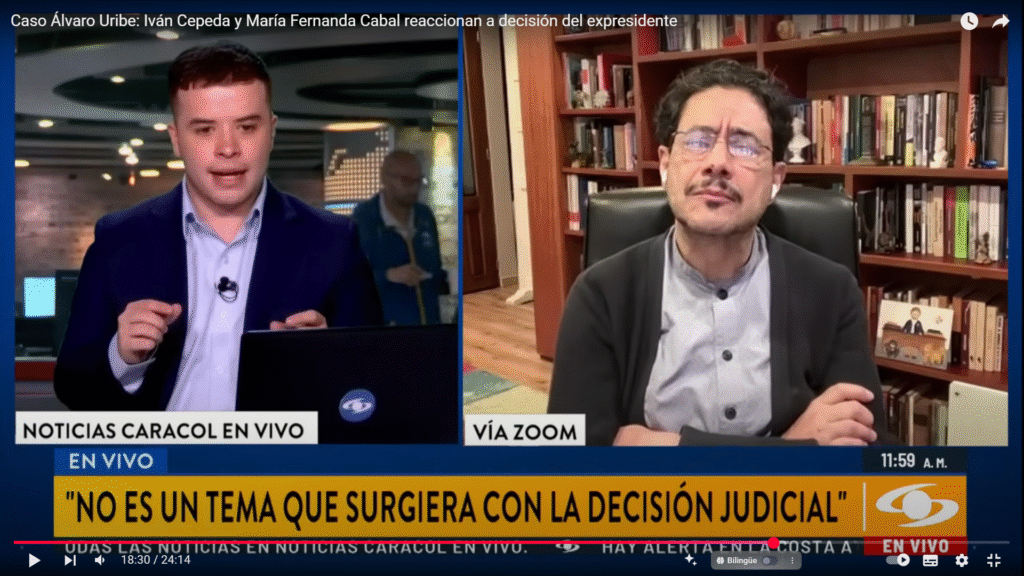The political landscape in Colombia is beginning to take shape ahead of the 2026 presidential elections. Over the past weekend, various movements and announcements placed pre-candidates from different ideological sectors at the center of the debate, confirming that the electoral contest will be marked by strong polarization between the right and the left.
Two names caught the attention of the media and public opinion: María Fernanda Cabal , a senator from the Democratic Center and one of the most critical voices of the current government, and Iván Cepeda , a senator from the Historical Pact, who officially announced his candidacy after receiving support from social organizations and victims of the armed conflict.
These announcements not only demonstrate the breadth of the field of candidates, but also reaffirm that Colombian politics will continue to revolve around debates about security, justice, health, and the administration of former President Álvaro Uribe, whose judicial process continues to generate backlash.
How will the Democratic Center candidate be chosen?
One of the most discussed points is the mechanism by which the candidate of the Democratic Center , a party founded by Álvaro Uribe Vélez, will be selected . According to Cabal, with the addition of Miguel Uribe Londoño to the group of pre-candidates, the decision has been postponed to December 2025, when a national poll will be conducted.
The senator clarified that this mechanism will allow for internal debates in which each candidate will present their proposals. However, she made it clear that the ultimate goal is to reach March 2026 with a single candidate who can represent the entire opposition in the elections.
María Fernanda Cabal: proposals and main objectives
Senator Cabal reiterated that her campaign is focused on three key pillars that, according to her, address the greatest concerns of Colombians:
- National Security : “Without security, there is no development, and without development, there is no peace.” Cabal proposes resuming policies to eradicate and fumigate illicit crops, asserting that these were effective during the Uribe administration.
- Health Defense : He criticized the current government’s reforms, claiming they destroyed a system that guaranteed 98% coverage. He proposes restoring efficiency with the support of technology to reduce corruption in the sector.
- Individual and economic freedom : Inspired by liberal movements such as that of Javier Milei in Argentina, it affirms that the State must guarantee legal security and protection of private property so that citizens can generate wealth.
Iván Cepeda officially announces his candidacy for the Historic Pact
For his part, Senator Iván Cepeda surprised everyone with the announcement of his pre-candidacy, made in Pasto and accompanied by endorsements from social organizations, victims of the State, and members of the Historic Pact.
Cepeda stated that his decision is not linked to the judicial process against former President Uribe, although he acknowledged that this issue will continue to influence the political debate. According to him, his aspiration responds to a request from various sectors that urged him to take the step, after having ruled out the option in the 2022 elections.
Among his proposals and approaches, Cepeda highlighted:
- Defense of human rights as the central axis of his candidacy.
- Unity of the Historic Pact , despite internal differences. He called for debates to take place within the movement, not in the media.
- Denounces smear campaigns : He announced legal action against members of the Democratic Center who have accused him of having ties to the FARC, accusations he described as dangerous and unfounded.
Former President Uribe’s influence on the campaign
A cross-cutting theme in both announcements is the figure of Álvaro Uribe Vélez , former president and natural leader of the Uribe movement. His decision to waive the statute of limitations on his legal case was interpreted in contrasting ways:
- For Cabal, it is a sign of honor and greatness, defending his innocence without taking advantage of legal resources that could favor him.
- For Cepeda, this is a political move to buy time and maintain relevance in the public debate during the campaign.
This confirms that Uribe’s campaign will continue to be a source of polarization, influencing the narrative of both the right and the left.
Benefits of closely following the pre-candidacies
For citizens, staying informed about presidential candidacies brings several benefits:
- Clarity about proposals : know firsthand each candidate’s plans regarding security, health, economics, and justice.
- Greater political participation : Understanding the internal selection mechanisms in parties like the Democratic Center helps to assess how candidates are constructed.
- Objective evaluation : Analyzing speeches and comparing promises with past events allows for more informed decisions.
- Preventing misinformation : By accessing reliable sources, you can avoid falling for the rumors or fake news that often proliferate during campaigns.
Steps to stay better informed ahead of the 2026 elections
If you want to follow this process closely and participate more consciously, here are some practical steps:
- Follow internal party debates , which will be broadcast on media and social networks.
- Consult voting intention surveys , understanding that they are a snapshot of the moment, not a definitive result.
- Review the proposals published on the official websites of candidates and political movements.
- Compare positions on key issues such as health, safety, economy, and the environment.
- Participate in local discussions or community forums to hear directly from candidates.
A panorama that is just beginning
With one year to go until the presidential candidates are officially announced, Colombia is already experiencing a campaign atmosphere. María Fernanda Cabal is seeking to consolidate the right under the umbrella of the Democratic Center, while Iván Cepeda is emerging as one of the left’s strongest candidates within the Historic Pact.
The debate over security, health, and justice will set the course of this contest, in which Uribe’s legacy and Petro’s administration will be inevitable points of reference.
The road to 2026 is just beginning, and citizens’ responsibility will be to analyze objectively, participate actively, and demand clear proposals that respond to the country’s challenges



